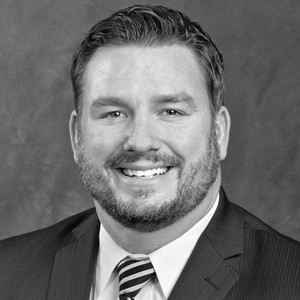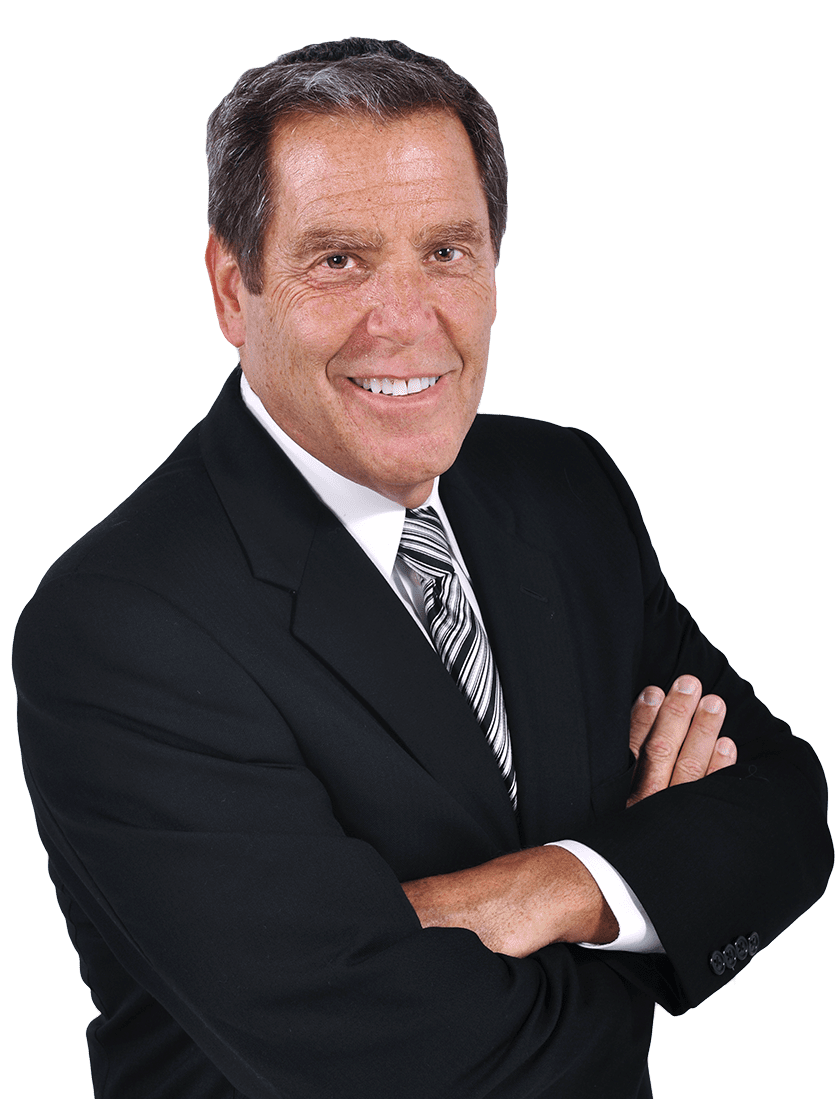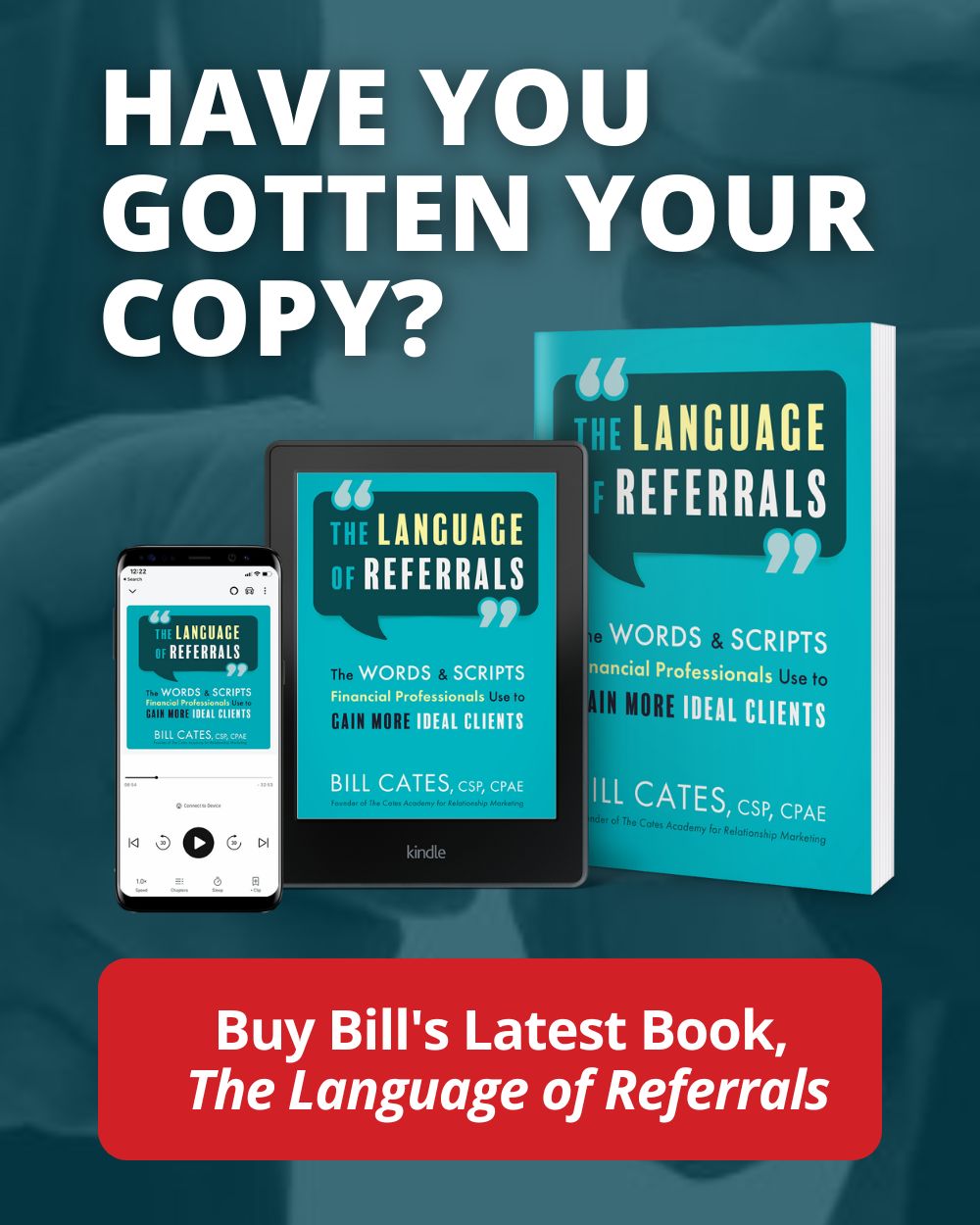Check Out Bill Cates’ NEW Top Advisor Podcast™
Interviews with Top Advisors for Top Advisors!
Top Advisor Podcast™
Ep. #68 – How to Find Your Niche Market and Craft Your Origin Story to Build Trust with Dan Brothers, CFP®
Do you have an “origin story?” Are you using it to attract more Right-Fit Clients™ and become more referable?
Have you figured out how to find your niche market – specifically one that’s clearly defined and profitable? Have you moved away from prospecting to attracting people to you?
In this episode of Top Advisor Podcast, host Bill Cates interviews financial advisor Dan Brothers, CFP®, who shares his insights on using his origin story to build rapport and trust with clients. Dan also reveals his strategy for selecting and focusing on a clear target market, that has propelled him to the top echelon among his peers.
Want More Top Advisor Podcast Episodes? CLICK HERE!
–
Bill & Dan discuss:
- Utilizing your “Origin Story” to connect with clients and prospects on a personal level.
- The importance of being genuine and authentic in how you communicate your value to prospects and clients.
- Factors to consider when trying to figure out how to find your niche market in financial advisory.
- His decision to focus on a niche market of individuals nearing retirement and the subsequent choice of a second niche to focus on asset accumulation.
- The role of his wife, Ashley Brothers, in defining her own niche with blue-collar-millionaires.
- …And so much more!
Resources:
Connect With Bill Cates:
-
Show Transcript
Ep. 68 with Dan Brothers
Bill Cates: Welcome to the Top Advisor Podcast, brought to you by ProudMouth’s PodRocket Academy. I’m your host, Bill Cates, creator of the Cates Academy for Relationship Marketing. In each episode, I interview one of our industry’s top performers, getting them to pass on their secrets to success to you so that you can impact more lives and generate more income Now onto the show.
Welcome, welcome. Before we get going, I wanna let you know about some free resources that I invite you to retrieve. After you’ve listened to today’s interview, you’ll find checklists, guides, videos, and other tools. Simply go to referralcoach.com/resources. Now write this down unless you’re driving. That’s referralcoach.com/resources, and it’s also in the show notes.
While you’re there, make sure you sign up for our free weekly tips. We’re always sharing best practices, and we’ll notify you of our newest podcast interviews as they go live. And while these are free to you, I think you’ll find them quite valuable. I also wanted to let you know about two books that are currently bringing a lot of value to financial professionals.
My newest book, the Language of Referrals, is your blueprint for the words and phrases you can use. Become more referable, more proactive, without begging or pushing and turn referrals into effective introductions. Also, my book, Radical Relevance is changing how advisors look at and then communicate their value in a more compelling fashion.
The subtitle of Radical Relevance says it all. Sharpen your marketing message, cut through the noise and win more ideal clients. To learn more about these books, go to LanguageofReferrals.com. That’s LanguageofReferrals.com and or RadicalRelevanceBook.com, RadicalRelevance book.com. And now on with today’s show.
I’ve been looking forward to this interview with my guest, Dan Brothers for some time. Dan has built a very nice business and he’s a really nice person, so it’s gonna be a nice interview. In this show, we’ll focus on two main topics. First, how Dan uses what he calls his origin story to build rapport and trust with his prospects and clients.
And second, the success he’s having by focusing on a clearly defined niche. And with that, the realization that he had about having to pick a second niche. So we’ll get into all of that. Dan Brothers, CFP has been an advisor for over 14 years, and in that time has risen to the top echelon among 19,000 advisors in his company.
That’s pretty high echelon if you ask me. His wife, Ashley Brothers, has been an advisor for over nine years, and recently joined in partnership with Dan. So Dan Brothers zooming in from Danvers, Massachusetts, which is about 30 miles north of Boston. Welcome to Top Advisor Podcast.
Dan Brothers: Bill, thank you so much for having me.
I was thinking about preparing for our conversation today, and I, I would be remiss to not mention the fact that Radical Relevance, as we’ve discussed before, was one of the watershed moments in my career. I’ve had two of them, and hopefully we’ll get into that today. But I just wanted to thank you for including me in your work and allowing me to be a guest on your show today.
Bill: Great. Two watersheds, which is better than two water boards. Um, so Badda boom, I teach a concept that I call your client-Centered Why story, it’s why an advisor believes in his or her value. You could even say it’s their emotional connection to their value. And the client-centered part is when they bring the story back to how it benefits the listener.
It’s like, you know, why am I telling you this about me? Here’s how you benefit from this. So now I believe you have a, uh, a story like this that you call your origin story. I’d like you to give us a little bit of the story and then tell us how you use it with prospects and our clients and the value it seems to bring to everyone concerned.
Dan: Sure. You know, I call it the origin story because I grew up in the eighties and that was the, um, a major time in the comic book world. So I like to vision myself of having an origin and, you know, it, it really goes back to. An experience that I had with my own family, and this goes back about 15, almost 16 years now, Bill, and unfortunately, my father passed away at an early age, 58 years old.
And at that time I was working in fleet sales. I didn’t have a lot of experience at all with anything other than contributing to a 401k. So I knew next to nothing about finance and. Because of the way that they had structured their relationship. My father was really in charge of everything when it came down to the finances.
And when faced with this difficulty of taking this over without any knowledge or background, my mother really struggled in trying to figure out what were the right things that she needed to do. And we didn’t have a financial professional that we worked with. And I really felt powerless at this time, Bill.
So it really became a passion of mine to. Understand that this is gonna be something that happens to people very often. There’s all types of life changes that will occur, and it really made me truly believe that my calling was to make sure that another family doesn’t go through an experience like that without somebody who, who really cares about them and, and shepherding them through their hardship.
Bill: Uh, sorry for this, that it happened to you and it’s led you to this great career. Has it not?
Dan: Oh, it, it certainly has. You know, the one thing that I, there’s a lot of things that I believe in this world, and, and one of those was from my father. And he would always say, you get back what you put into things, whether it was sports, whether it was schoolwork.
Um, he always said, if I put as much effort into my schoolwork as I did into remembering movie quotes, that I would be one heck of a student. But nonetheless, he said, you always get back what you know, what you put in. Right. And for me, I’ve always found that that was a hundred percent true when it comes to this career.
Bill: So how, how do you use the story when, when in a relationship with a prospect or client? Do you, do you tell the story? Um, you know, how, how do you use it, I guess?
Dan: It’s a good question. I have it on my bio so that when people are searching for me and they, they find a landing page that they can maybe identify with my story and multiple times, Bill, I’ve had people reach out to me because of the bio.
So I would certainly recommend to anybody out there who has a story that they want to tell to make sure that that’s front and center and then really. When I’m connecting with somebody during my first, you know, part of our process in our practice is to have much like everybody else, an onboarding meeting or an initial consultation to understand the needs of a client as uh, or a potential client.
And I often share stories that, that story with them to explain to them, you know, I’m. Not necessarily here by happenstance because I found a career that I thought was interesting or because I studied it in college, it was something that, um, I’m very passionate about because solving those problems for people is something that’s very important to me on a very personal level.
Bill: So you’re saying that on your website you have this story and you, you know, that the story has prompted someone. To contact you? I guess it’s ’cause they mention it, right? They say, I, I read your story. I like what you had to say. Give us some specifics.
Dan: Absolutely. So there are multiple times where I’ve had people mention the story and there was one time in particular that I can share with you where somebody reached out to me because they did lose their father.
When they were reading different bios and reading different websites of advisors and teams and different companies across the, the web of, of advisor of, of financial advice, they said that that particular story resonated with them so strongly because it was something that they were going through at the moment and they felt that having somebody who could directly relate to their particular story and would know and have really.
A deeper understanding of the types of things that they were going through was very important to them at that moment.
Bill: So one last little question about this, and then we’ll shift, uh, our conversational a little. But, uh, I, you know, in doing what I do, giving live presentations, coaching, I’ve identified a lot of advisors who have a story like this, some as dramatic as yours, some not as dramatic, but they have a story, but they’re not always sure if they should tell it, when to tell it.
Should they tell it? What? What would your advice be to them?
Dan: You know, Bill, my advice would be it is extremely important in this industry to be your genuine self at all times. I feel that, especially newer financial advisors, and I find myself coaching often with newer financial advisors, I. They feel as if they almost have to put a facade or a vision of what they think a financial advisor looks like.
And what I challenge them to do is to really bring out their, their inner self, the, the passions that they have about life or about problem solving, or about why they do the work that they do. And to me, you know, my advice directly would be concentrate on being you.
Bill: Mm-Hmm. Yeah. You know, I was delivering a presentation actually just yesterday to a group and, um.
I forgot where I was. Uh, Southfield, uh, Michigan, um, and. Interestingly, we were talking about this and one of the gentlemen in the room, a gentleman by the name of Ryan, had a great story and I was talking about for the newer advisors in the room, if you don’t have a story yet, if you don’t have this, why, if you haven’t gotten that emotional aha moment of connection to your value, you can use someone else’s story.
And I, and I say, you don’t steal the story. You don’t pretend it’s yours. You just say there’s a, I have a colleague and, and. When I learned his story, that’s, that was my aha of, of the value. And it turns out that the, the guy, the younger advisor sitting next to Ryan was also named Ryan, and he uses the older, more experienced Ryan’s story, just the way I explained it.
He says, you know, there’s another advisor in my office and his name is Ryan, and this was his experience. And when I learned about that. That’s when I really got in touch with the value of the work I bring to other people. And so I just wanna pass that message on to our listeners, that, uh, you may have a story, you may not yet, you may be looking for other, you use someone else’s, don’t lie.
You know, let it, let them know it’s someone else’s. But if it inspired you and it’s helping you get in touch with your value and that’s a benefit to your prospect or client, by all means use it. Um, I think that’s a great piece of advice, Bill. Great. Thank you. Uh, and I know you teach a lot of other advisors, uh, in your firm, so, uh, pass it on if it makes sense.
So let’s move, uh, our discussion to your decision to focus on a very clear niche. Uh, I, I foreshadowed the fact that you’ve chosen a second niche. We’ll get into that later. Let’s take your main niche, you know, what is your, and has been your well-defined, uh, niche and how, how did you come by the decision?
Dan: Well, your work had a big impact on developing what I call a defined niche or an ideal client. Mm-Hmm. Radical Relevance, as I mentioned earlier, was one of two watershed moments, so I’m gonna just give the first watershed moment, and that was when I thought of my practice as a CEO rather than an advisor to understand that it was a business, that I did have to know the analytics, that I had to understand being a business owner.
Now to get deeper into the second watershed moment was really this niche development. When I read Radical Relevance, I had all these separate ideas kind of floating in my head about how I could be my most genuine self, how I could get my message out there, and how I could help as many people as possible.
But then I realized in the back of my mind that I couldn’t be everything to everybody, and that if I tried, I wouldn’t be as effective. Trying to be everything to everybody and and reading Radical Relevance Bill was actually something that kind of was, it put all the pieces together for me. So the niche that I defined for myself was I work with individuals and families who are no further than five years away from their retirement goals.
That is right out there on my LinkedIn and it’s out on all my marketing materials because I learned from Radical Relevance that you wanna align all of your messaging in one succinct sphere of marketing. It’s, it’s something that at times was difficult because I questioned if I was trying to specifically go after one niche, was I precluding myself from working with everyone else.
And then it kind of dawned on me, well, if they’re not. At the doorstep, then they’re probably already saying no to me. So maybe I’ll be more valuable to a, a more specific grouping. Much like taking a, a laser focused approach versus the shotgun approach.
Bill: Yeah. So clearly when, when you put it out there like that on your website, LinkedIn profile, if someone is not in that, uh, time of life, then they’re gonna say, well, alright, not for me.
Um, a lot of advisors. Get anxious about that. Right. They’re gonna miss other opportunity. Sounds like you’re at a place in your practice where you just wanna attract the people that are the right fit and don’t really worry too much about the others. Is that true?
Dan: It is. I would say I, I’ve taken the niche a little bit deeper because you only have so many characters that you can use in some of these websites.
Sure. But I, I also specifically work with people in the Greater Boston area who tend to be in finance, which is ironic because I’m in finance. Um, but I did find that there is a, a unique niche of people that really wanted kind of the separation of church and state at their firm. And I’ll give you an example, Bill, of why I think it is important.
To be more specific, let’s say you’re at a networking event and you’re meeting 25 people and maybe you’re having cursory conversations with 25 people and we’ve all been there. You hand out business cards. It’s a quick. Two minute conversation. But if you get a chance to speak in front of that group and you say, I specifically work with people that are, you know, insert the niche, um, tattoo artists or dentists, and there’s a tattoo artist and a dentist that’s at that event, guess who’s gonna come seek you out to have that conversation?
Bill: Yeah. Interesting. Um, I like your sense of humor. Um, so how, how many years into your practice were you before you decided to focus on this niche? Sounds like it was about 12 years, give or take.
Dan: Yeah, it was 10 years. The thoughts, 10 years in the thought really came to me. Mm-Hmm. And it was really the, you know, like I said, Radical Relevance was the push to say, I’m, I’m all in here.
Yeah. Yeah. I wish it was sooner though. Bill, I have to tell you, I, one piece of advice that I would give anybody is the quicker that you can get to a niche, the better off you are.
Bill: I can’t tell you how many times I’ve heard that I even coach folks. You talk to anyone else who’s got a niche and they’re doing well in it, they’ll tell you almost to a person, they all wish they had done it sooner.
One another interview in my, in the Top Advisor Podcast is, uh, Craig, um, I can’t pronounce Craig’s name right, uh, sch Mila. Uh, it’s an interesting name. But anyway, he focuses on optometrists and when I interviewed him, he said, I wish I had done it five years sooner. It’s, uh, it’s. That important. Um, a lot of folks come to me and say, Bill, I think I got a niche.
I’m not sure. What do you think? And that’s some of the work I do with folks. So. Dan, in about 90 seconds we’re gonna continue this conversation about your niche and how you realized you needed to pick a second niche on which to focus and how your wife picked her niche, which is very different than yours.
After that, we’ll finish up with your long-term vision for your business. ’cause I think many of our listeners may find your vision to kind of is inspiring. Uh, but first let’s take a brief pause to listen to a word from our sponsor, pod Rocket Influence Academy. Brought to you by ProudMouth first. They make this podcast possible and their core business is helping advisors accelerate their influence through marketing activities like podcasting.
SPONSOR MESSAGE: This podcast is sponsored by ProudMouth, the Influence accelerators. If you’re like our clients, you wanna spend more time educating people and less time selling. That’s why we turn Main Street experts like you into trusted mainstream authorities. We help you amplify your influence over a growing audience of magnetically attracted fans who will chase you down instead.
Visit ProudMouth.com to learn more.
Bill: I’d be remiss if I didn’t at least mention one of our resources designed to help you acquire more right-Fit clients, our newest even better than before, academy for Relationship Marketing is ready to help you truly build a strong culture of client acquisition through personal introductions.
After all, this is how most of your ideal clients would prefer or meet you. Through a recommendation from someone they already trust. So do yourself a favor. Visit the Cates academy.com. That’s the CatesAcademy.com. You can go through everything on your own or you can add some one-on-one coaching with me if you want.
And if you decide to join our academy, make sure you use the coupon code TCA 200 and you’ll save $200 off the already affordable tuition. Now back to my conversation with feature guest Dan Brothers, CFP, hailing from Dan versus Massachusetts. Dan, when we were preparing for this interview, you mentioned that you’ve decided you decided to pursue a second niche for your business.
What prompted that decision and what is the second niche?
Dan: I did Bill, I think. It really comes down to what I had mentioned before. The first watershed moment of my career was thinking like a CEO, understanding revenue and expenses and the analytics of your business. And what I found was that I was at a point where I was successful, but I noticed that there were a lot of assets that were leaving the practice.
And just like any other business owner, I wanted to say, okay, well what’s the problem here? And in our world, as many advisors know, the lifeblood of the business are, are assets. Uh, so revenue in would be new assets in revenue out, potentially new assets out. Now you can’t go and tell somebody that they can’t have their money, otherwise we’d be out of jobs pretty quickly.
Right? So you can’t, you can’t stop the funnel on the bottom. And I don’t think I wanted to chase assets for the rest of my career either because I, there’s only one Dan Brothers. So I said, there’s gotta be another way to do this. And I realized that the assets were flowing out because of the niche that I served.
The people were taking the distributions from their hard-earned savings, and I was helping them on an income plan. So the solution to the problem was to develop a second niche, and that niche is accumulators. So I thought to myself, there was an issue that I had in my own life with Ashley where we were doing well, and we started to use.
Different types of tools besides 4 0 1 Ks and traditional ways of investing. And I said to myself or to my wife, Ashley, there’s gotta be other people that are going through this, right? So we’ve got a situation here that potentially we’ve got a group of people that we could serve better. Um, and that’s when I develop this accumulator niche.
And I specifically target four or five companies in the Boston area for professionals that are 45 to 55 that are, uh, making, you know, over $350,000 a year.
Bill: All right, so let me, let me break this up. So 45 to 55, 300 KA year more, is that what you say? Or three 50. 350,000. Three 50, uh, and some specific firms.
So I like that because. There’s two ways to look at the niche or the market, right? There’s kind of the category of five years or more or less to retirement. There’s age 55 to 45 to 55 making a certain income, and then there’s where they work, which is, to me, generally speaking, the narrower the better. And focusing on, um, on employees in a, in a company is always a great market.
You get to know their benefits package. I mean, the, the group I was speaking to yesterday, I mentioned they’re, they’re, uh, the company they focus on is at and t employees. And that’s what the firm actually started focusing and, you know, was started to, to help at and t employees. And they know the benefits package better than the HR department knows it.
And, and the, and the prospects and clients see that right away. It’s always easier to get referrals, uh, and introductions in in a market like that, in a vertical market. So are you, I don’t know how long you’ve been doing this, but are you starting to see that synergy come together?
Dan: Absolutely, I think you do a good job in framing that.
You know, I. Truly believe that advisors who are fully educated on the benefit packages within a company can be more valuable than the HR department themselves. Yes. And understanding how those. Taking it further and understanding the language that’s used in those benefit packages. It reminds me of, uh, a part of your book where you had an advisor who was so intimate with the knowledge of a particular type of doctor that started to use doctor codes, um, when, when talking to them.
But it makes you so much more relatable. Right. It makes you, it makes you appear as if you understand them on a personal level, understanding the words they use for stock options or the particular 401k plan or defined benefit plan. It, it, it makes you seem like you are a resource that they cannot live without.
Bill: Yeah, and you get to know other, other jargon too, in the company. I interviewed Don h who focuses on Google, and you know, in Google they call themselves Googlers. And it, you know, you learn all of that stuff and it, it, it makes you more, you know, drum roll, please. Relevant, radically relevant. Uh, and I did not expect this, uh, interview to be a commercial for my book.
Radical Relevance, but I’m not gonna delete it. Uh, so if anybody’s interested, Radical Relevance book.com. Um, let’s, let’s, uh, selfless promotion there, here, uh, your wife also focuses her practice on a niche, a different ni niche I may add. Uh, tell us a little bit about her process and, and you know, just the, the benefits to her and her clients to that.
Dan: Sure. You know, I’ll add to this niche conversation, please. The hardest thing that I think, especially newer advisors or even a veteran advisor who’s considering going into this. Realm of, of niches and defining an ideal client. It’s where to start. And I always encourage people to start by addressing the problems that you enjoy, solving the work that you love to do.
Another story from my dad, just like I’m sure many of our listeners, the listeners, they’ve had their dad say the same thing. If you love what you do, you never work a day in your life, right? It’s cliche, but it’s a hundred percent true. So. When you ask the question about my wife and her niche, she, um, was the daughter of, uh, her, both of her mother and father were entrepreneurs.
They were successful entrepreneurs and, um, they were blue collar. They did all their own labor. And, you know, as a result, she knew, she knew that she wanted to help people in that same area. So she has defined a niche of blue collar, uh, uh, business owners in the HVAC and electrical. Industries in and around Greater Boston, and more specifically in the Danvers area because she knows the unique challenges that people go through.
And oh, by the way, because they’re cut from a certain entrepreneurial cloth, she finds it very relatable. Like she’s having a conversation with her own parents.
Bill: Yeah, she has an affinity to those folks. She feels comfortable with those folks. Um, a gentleman I coach, uh, Dennis O’Keeffe, focused on Verizon in Fall River, uh, Massachusetts, but it’s mostly the, uh, the lineman.
And line women, I guess, uh, the, you know, the blue collar, uh, within Verizon and it’s just, there’s an affinity there. And a lot of these folks have, as you know, have saved quite well. They have assets, uh, sometimes even a little more sophisticated than you might think. They might, they would be. And, uh, so.
Good for her. It’s, uh, sounds like it’s a benefit to them and a benefit to her by doing that. It absolutely has been. The, the last thing I wanna focus on, I think we’ve hammered this niche thing pretty nicely. Uh, I I is kind of moving forward your, I’m fascinated by your long-term vision for your business and for your life in general.
You told me. That if you were not an advisor, you’d either be a a, I think you said I’m, I hope I’m saying this right, you can correct me. Fireman, teacher, coach, fireman, teacher coach, or football teacher, coach. So I dunno if that means teaching and coaching. Fireman or teaching. Tell us about that. You know, where do you see yourself in like 20 years, give or take?
What does that look like?
Dan: Well, it’s a good question. I think the fireman is a holdover from the youth, right? Wearing the fire helmet, seeing the flashing lights, seeing the cool uniforms. So I think that that’s been something that’s maybe deep seated and I’ll never get rid of the, the going in and saving somebody.
Right. I mean, that probably aligns really well with my origin story, but I’ll tell the story of when I first moved to this area. I came from New York. To Boston, which was a challenge in and of its own right. But I tell everybody, I’m a Mets fan, so I’m really no threat to you here in Boston. Um, but when I moved here, Bill, I didn’t know anybody.
And it’s kind of hard to start a personal relationship type business when you didn’t know anybody. So what I decided to do is I went and I, I, I. I coached youth football, uh, freshman football at Marblehead High School and I coached youth baseball and I found that that was something that I really enjoyed giving.
I had the extra time as a new financial advisor and to me. If I take that vision of how I started my practice about, you know, my background and said, okay, 20 years from now, what does life look like? Well, Bill, I think it’s pretty simple. I would want to coach financial advisors, work with a small niche of clients, um, within my own practice.
Of people that I just really enjoy being around, spending time on the golf course, enjoying their life, um, their, their, their life, uh, experiences, things that come up for them, and, um, really teaching other advisors how to build a successful practice and do good work to help other people. And oh, by the way, Bill.
We’ve mentioned in this before, inside conversations. My vision of this would in involve working abroad for about four to six weeks and serving that client base while traveling the world. It’s been something that I’ve become very passionate about over the years.
Bill: You know what? These days you can do that, can’t you?
I mean, the time zone thing, you gotta factor in a little bit, but you could work from really anywhere in the world. I interview the guy, his interview has not gone live yet, but he worked outta Costa Rica for three years serving clients in the United States. Um. So I think that’s great. It sounds like, you know, you could be a candidate to take over my business at some point.
Maybe we should, uh, chat about that. Um, I would love that I have this vision of myself
Dan: wrapping up the day at 10:00 PM in Italy and going to dinner.
Bill: And that’s what you would do in Italy at 10:00 PM Me? I’d be asleep by then, but that’s a different story. My featured guest on today’s show has been Dan Brothers, successful financial advisor, husband to Ashley Brothers, also successful advisor and father to Charlotte Hadley Brothers.
Dan, thank you so much for your giving nature, your teaching nature, and for being on today’s show.
Dan: Bill, it was a pleasure. Thank you so much for having me. I did want to wish my little girl who just turned 10 years old on Cinco de Mayo, a very happy birthday and uh, thank you of course, to my supporting and lovely, beautiful, and talented wife, Ashley Brothers.
Bill: Well said, my friend. Uh, to you, the listener of this podcast may ask you a favor. If you like this episode or like the podcast in general, please leave a five star review on the platform. You’re listening to this show, and not all platforms have a place for reviews, but if yours does, I’d be grateful.
Thank you. If you haven’t already, there are four places you’ll want to visit for my latest book. Go to Language of Referrals.com, Language of Referrals.com for a bunch of guides, checklists, scripts, videos, all kinds of resources. Go to referral coach.com/resources. Referral coach.com/resources. For the most comprehensive referral and introduction training on the planet, the Cates academy.com, the Cates academy.com.
And if you wanna check out the kind of coaching I do with advisors, coach Cates.com. This is Bill Cates or Coach Cates, reminding you that ideas do not make you more successful. Only acting on those ideas will bring you the success you desire. Thanks for stopping by.
Thank you for listening to the Top Advisor Podcast brought to you by ProudMouth’s PodRocket Academy. I encourage you to visit my website referralcoach.com for links to my books, online courses, and to register for the Cates Academy.
About Our Guest

Originally from Wappinger Falls, NY, Dan Brothers began his career in 2009. After seeing firsthand what can happen to families after catastrophic loss, Dan joined became an advisor to ensure he would be able to do everything in his power to help individuals and families prepare for what lies ahead.
Dan’s built his practice in the North Shore of Boston over the last decade plus, focusing on individuals & families within 5 years of their desired retirement goals.
Connect With Dan Brothers:
![]()
Never Miss an Episode!
Click below to subscribe on your favorite podcasting platform.
P.S. Don’t keep Top Advisor Podcast a secret … share with a friend or colleague!
Click Here to Subscribe Tell a Friend

About Your Host
Bill Cates, CSP, CPAE, works with established financial advisors to speed up their growth without increasing their marketing budget. Advisors tap into Bill’s proven process to multiply their best clients through introductions from advocates and Centers of Influence (such as CPAs and attorneys), communicate their value proposition more effectively, and create a reputation in a profitable target market. Bill helps advisors move from push prospecting to magnetic marketing – to attract more Right Fit Clients™.
Bill is the author of four best-selling books, Get More Referrals Now, Don’t Keep Me a Secret, Beyond Referrals, and Radical Relevance. Bill is a highly sought-after international speaker and coach, as well as the founder of The Cates Academy for Relationship Marketing™.
Do you know someone Bill should interview (including yourself)?
Do you have a topic you’d like to see covered?
Contact Bill Cates directly: BillCates@ReferralCoach.com







